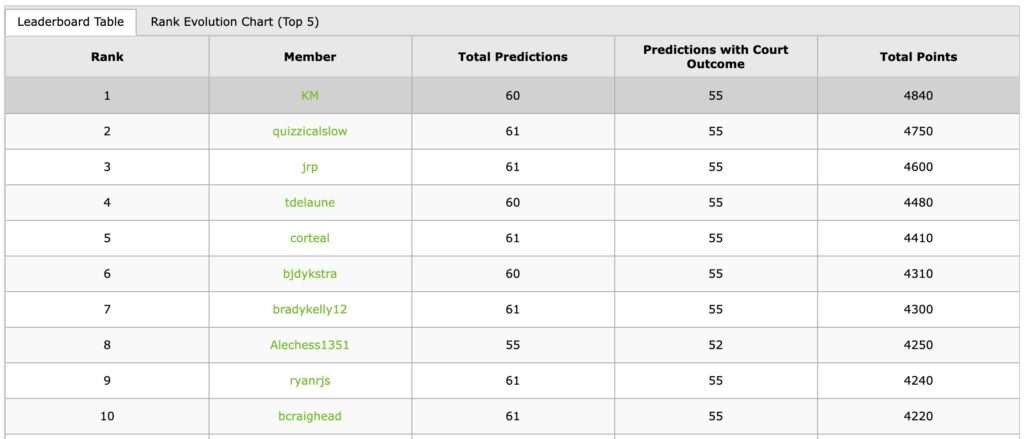The Volokh Conspiracy
Mostly law professors | Sometimes contrarian | Often libertarian | Always independent
Congratulations To Kirill Muzyka, Chief Justice of FantasySCOTUS for OT 2024

The October 2024 Term of FantasySCOTUS finally came to a close. On the whole, this term was a less predictable than some recent terms. In the aggregate, our crowd predicted 76.36% of the cases accurately, down from 83.05% of the cases accurately last term.
I am happy to announce that the Chief Justice is Kirill Muzyka. Players receive ten points for each correct prediction of a Justice's vote. We recorded 55 merits cases (DIGs do not count). A perfect score would have been 4,950 points. Kirill scored 4,840 points.
Here is the Top 10:

I usually ask the winner several questions to figure out their approach to predicting cases. Kirill's response was so thorough and insightful, that I reproduce it in its entirety:
My name is Kirill Muzyka. I'm from St. Petersburg, Russia, and I'm currently finishing my master's degree in Political Science at the London School of Economics.
My interest in American politics began quite some time ago, but I became especially focused on the U.S. Supreme Court in 2020, following the death of Justice Ginsburg. Her passing turned the Court into a major topic of public debate during the election, and that moment drew my attention. I eventually wrote a paper during my undergraduate studies on the Supreme Court's role in the polarization of American politics, and my interest in the Court has only grown since then.
What particularly drew me in was the contrast between the legal system in the U.S. and in my own country. The Supreme Court's dual nature — both legal and political — was fascinating to me. I was also struck by how the Justices manage to maintain respectful, even friendly, relationships despite deep ideological divisions. That kind of civility seemed rare and especially meaningful in today's political climate.
Since 2022, I've been listening to all oral arguments and making predictions about case outcomes for myself. In 2023, I began submitting predictions publicly through FantasySCOTUS. I've also read all of the Court's opinions from the past 2 terms. I really enjoy trying to understand the different perspectives each Justice brings, and I often try to reconstruct their arguments myself to determine which position I find most compelling. While I'm not a lawyer, I appreciate how the Justices generally write in a way that's accessible to an educated reader. In that sense, I'm especially fond of the opinions by Justices Kagan, Gorsuch, and Barrett — they're usually the clearest and most engaging to read.
When it comes to making predictions, I rely primarily on oral arguments. I think the post-COVID format — where each Justice has time to ask their questions — gives a clearer picture of how they're thinking about the case. If oral arguments don't reveal a clear outcome, I turn to other background factors, like the Justices' previous decisions or their overall judicial philosophy. Some Justices make prediction easier through their questioning. For instance, Justices Alito, Sotomayor, and Jackson often clearly signal their positions during arguments, which allows for solid predictions. Others — like Justices Chief Justice Roberts and Justices Thomas and Barrett, — tend to be more reserved and balanced in their questioning, so background information becomes more important. Justices Kagan, Gorsuch, and Kavanaugh fall somewhere in between.
When I listen to arguments, I pay particular attention to "friendly" questions — the kinds that help, rather than challenge, an advocate's position. While Justices may press both sides on weak points, they rarely throw supportive "softball" questions to the side they ultimately oppose. I also find Oyez especially helpful — having both the audio and the transcript available in the same place makes it easier to fully understand the Justices' wording and tone.
Because I've been closely following the Court only in recent years, the only personnel change I've directly experienced has been Justice Jackson's appointment. Her style is notably clearer than Justice Breyer's often convoluted questioning, and she typically makes her views evident during argument. That has made case prediction somewhat easier — though not significantly so, given that she's part of the liberal minority and doesn't often determine the outcome.
In terms of case types, I find that technical statutory cases are generally harder to predict than high-profile constitutional ones. For example, this term, cases like Feliciano, Advocate Christ Medical, Bufkin, and Stanley were among the most difficult for me. That's, in my view, because in such cases, oral argument really can make a difference — the Justices often come in without firm views and genuinely explore the issues. In contrast, in more ideological cases, the Justices often already hold strong positions and are less swayed by the details. A good example of this contrast was the one argument I attended in person while visiting the U.S. as a tourist. — Mahmoud v. Taylor. After waiting in line for seven hours, I finally got in. It was a fascinating experience, but I doubt the oral arguments had much influence on the Justices, as they seemed to have already made up their minds based on ideological grounds.
I realize it may seem unusual for a complete foreigner with no formal legal training in the U.S. to be so interested in the Supreme Court. But coming from a country where the rule of law is almost absent, it's genuinely inspiring to watch a legal institution function with such intellectual rigor. While I understand and respect the perspective of those who view SCOTUS as primarily a political institution — "politicians in robes," as some say — I believe that's only part of the story. In reality, the Justices often demonstrate complexity and depth in their reasoning, and their opinions frequently reflect that nuance.
As someone from an authoritarian background, I'm deeply impressed by a system in which judges must publicly explain their decisions (putting aside the shadow docket), where legal reasoning matters, and where debate — even among ideological opponents — can shape outcomes. While my personal political leanings tend to align more with the liberal side of the Court, I've found that many conservative opinions are more thoughtful and well-argued than they are often given credit for. In my view, the American judicial system — though far from perfect — is an institution of extraordinary interest, and I look forward to continuing to follow it closely.
Well said. The seventeenth season of FantasySCOTUS will launch on the first Monday in October 2025.


Show Comments (5)